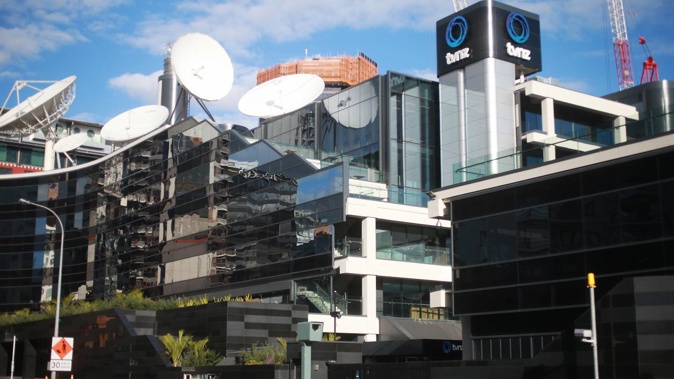
The Government's new public media entity will witness the loss of a third of TVNZ's existing commercial revenue, equating to about $100 million a year, within five years, according to advice from officials.
This lost revenue will need to be supplemented by taxpayer funding from the Crown, which is forecast to contribute $211m a year to the entity over 30 years, roughly half of which will be used to plug the shortfall in advertising.
The commercial details were revealed in a late draft of a business case for the Government's RNZ-TVNZ merger, obtained by the National Party.
The party's broadcasting spokeswoman Melissa Lee said the documents showed the Government was wilfully destroying TVNZ's commercial model and forcing the taxpayer to pick up the tab.
The Government argued this revenue decline would take place with or without the merger as a result of the changing advertising landscape, meaning one way or another the taxpayer would have to come to the rescue of TVNZ.
Lee called the proposal an "ideological pet project for Labour", saying the party had "never been able to give a good reason for spending taxpayer money on this costly merger".
"Taxpayers should not be expected to pay billions of dollars to merge two existing media entities that are doing fine operating on their own," she said.
The full and final business case was finished in August last year and is now publicly available, however commercial details about the entity's funding were redacted. The leaked copy includes those details.
Broadcasting Minister Willie Jackson said the business case was over a year old and "many of the financial assumptions are out of date and have changed since then".
He added that "addressing falling advertising revenue'' is a key reason for the new entity's establishment.
- The TVNZ-RNZ merger is still being debated at select committee
- Why is the TVNZ- RNZ merger even happening?
- National leader Christopher Luxon decries 'wasteful spending' at Party Conference
- 'We need them to change their attitude' - Broadcasting Minister's swipe at TVNZ
Jackson said the Government was not "seeking to swap advertising revenue with Government support, the table reflects the reality that advertising revenue is projected to decline over the coming years".
He said if the entity did not see a decline in revenue as projected, then the Government would not need to put in as much money as the business case forecast.
The Government is in the midst of merging RNZ and TVNZ into a new public media entity with a view to having the entity running by the middle of next year.
RNZ is Crown-funded and does not carry ads, while TVNZ is owned by the Government but runs as a commercial broadcaster, funding its operations mainly by selling advertising.
The Government's proposed merged entity will have a mixture of funding sources, preserving part of the models of both RNZ and TVNZ.
Some of funding will come from the Crown, but some will continue to come from commercial sources - mainly advertising.
The new entity will have a public service mandate, which it will have to fulfil alongside its requirement to generate some commercial income.
A chart in the document shows that officials believe merging TVNZ and RNZ would hit the commercial revenues of TVNZ significantly, declining from about $320m in 2023 to just over $200m in 2028.
By the beginning of the next decade, officials model this revenue will have fallen below $200m.
Over the next 30 years, officials have said the entity will need $6.3b in new funding, or about $211m a year. Over the foreseeable future, the Crown will fund between 50 and 60 per cent of the entity's total costs.
Jackson argued the decline in TVNZ's revenue is one reason the reforms are needed in the first place. He argued that decline in advertising revenue across the media means TVNZ's fully commercial model is unsustainable going forward.
But that is hotly contested, not least by TVNZ itself.
/cloudfront-ap-southeast-2.images.arcpublishing.com/nzme/ZBEUOKIGKAZBQZROL5CKNUOWJE.jpg) Broadcasting Minister Willie Jackson. Photo / Mark Mitchell
Broadcasting Minister Willie Jackson. Photo / Mark Mitchell
A partially redacted part of the business case said the "need for Crown funding" was "driven" by declining revenue of 6 per cent a year and increasing costs of 2 per cent a year.
However, TVNZ's three-year plan forecast no overall decline in revenue because any decline in TV advertising income would be "fully offset" by growth in advertising online.
Officials appear to have been unconvinced by these forecasts, which they say were later "revised" to take "into account a steeper and accelerated decline in those revenues".
While Lee argued that both entities are currently operating fine, the business case warned that the operating model "for both TVNZ and RNZ – but particularly TVNZ – is not sustainable" and said that " increased Crown funding would be required in the near future".
Lee was disappointed the Government had not been more upfront with the financial reasons for the merger.
"The publicly released Cabinet paper behind the decision to merge RNZ and TVNZ contained almost no financial information about the new mega media entity, while Broadcasting Minister Willie Jackson has been evasive in answering questions. Now it's clear why," Lee said.
The Bill creating the new public media entity is currently at select committee stage.
It will transition both RNZ and TVNZ's staff and assets to the new entity, titled Aotearoa New Zealand Public Media.
The new entity will be officially established on March 1, 2023 and begin operating with its new funding and mandate in July 2023.
Take your Radio, Podcasts and Music with you









